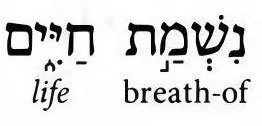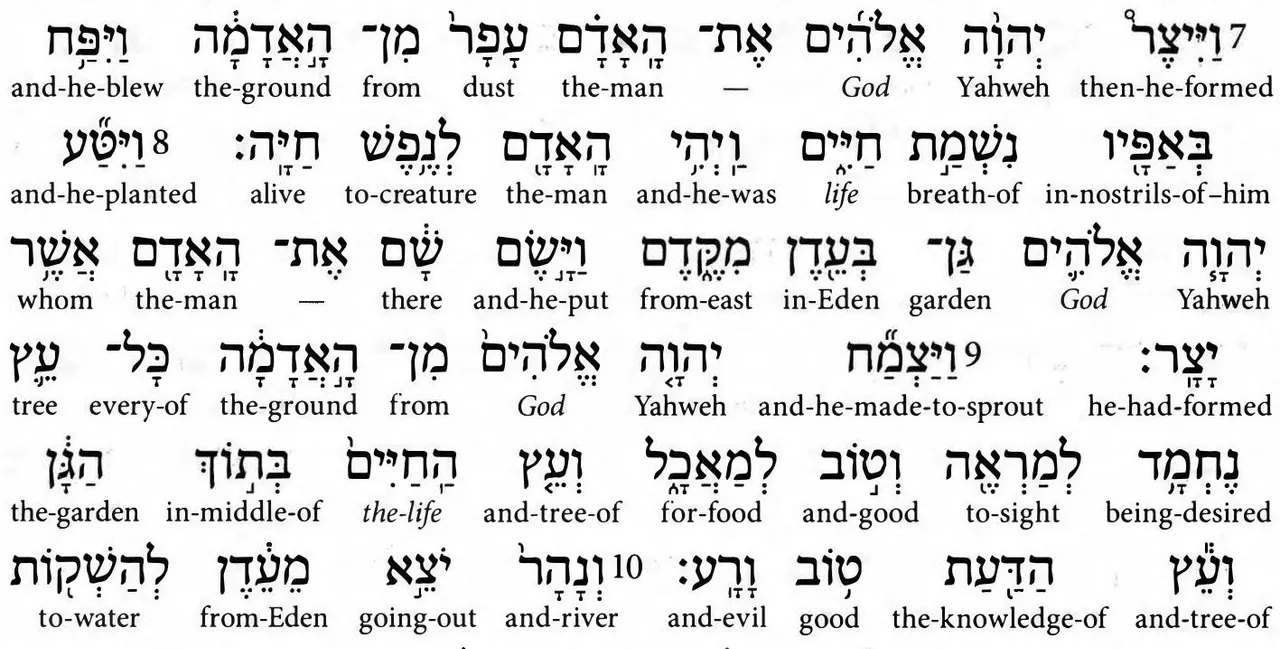Welcome back to my DTube Hebrew reading & language series.
The full study is now on line covering the Alef-Beyt here in my blog. This is a beginners program to teach letters, vowels, and reading. The vowels are marked in this bible and are designed to help avoid confusion on what a word is and how it is pronounced. The confusion is obvious in the hundreds of interpretations globally. In modern Hebrew, only children need a niqqud or vowel marking for each letter. Old manuscripts also usually have vowels marked.
This week - Genesis 2:7-10
Today's reading takes us from the formation of man to the planting of the garden and on to the choice of life or death, all in two verses. There is enough theology in these two verses to write a book or two. There are also some obvious answers to some long standing questions.
God formed man from the dust, breath into him, and he became a living soul. You may notice that there was no need to breath life into the woman.
Why?
Because God had already blown the breath of ha'yim (life - plural) into the man.


The ending im or eem in Hebrew is either plural or something that emphatically complete.
If plural, then lives in the man, enough for two when the woman was created.
If complete, then part of the body and part of the soul were both taken to make the woman.
Both work for me, leaving this open for interpretation via the rest of the Tanakh, but the second seems to go with the famous wedding verse, "... and the who shall become one flesh, and what God has joined, let no man separate." (loose paraphrase). I will not go into reading Matthew 19 in full.
A quick look at the Greek gives us 'sarx' (flesh) and my handy Hebrew B'rit Hadasha also gives me בשר אחד (one body). That said, there are many verses that say, it is not good for man to be alone. From experience, I can tell you that being parted from a wife feels like your soul has been ripped in two. Further study may render the union between man and wife to be the joining of souls as well as sexual union.
Moving on
He planted a garden with every tree that is desirable and good for food. Then after that, he (also) put the tree of life in the middle of he garden and the tree of knowledge there. This begs the question involving three types of trees. Those that were good for food, another of life, and the last of knowledge of good and evil.
- Many for food
- One for life
- One for knowing good and evil.
Food is obviously necessary for nourishment. One would argue that the other two trees were there in order to present man with the reoccurring choice of life or death.
Parallels.
Death was in man's future once he had watched as the woman ate, and he ate. Dominion over the world had been transferred to the adversary. Access to the tree of life was cut off along with entry to the garden.
Babel, trying to make a name (not God's name) for themselves rendered the death of communication, a dispersion to other locations (loss of community), and the loss of the tower they had been working on.
Israel, when disobedient, gave them captivity (death of their freedom), loss of their city (access to the land flowing with milk and honey), and the destruction of the Temple (access to God's presence).
Israel was constantly given the choice of to serve other gods or the one God. The consequences for their choices were consistent throughout their history. There are many other calls to "Choose."
- Deut.30:15 ... I have set before you today life and prosperity, and death and adversity.
- Deut. 30:19 ... I have set before you life and death, blessing and cursing: therefore choose life.
- Prov. 18:21 Death and life are in the power of the tongue, And those who love it will eat its fruit.
- Jer. 21:8 "Behold, I set before you the way of life and the way of death."
- John 10:10 The thief comes to steal, kill, and destroy: I am come that they might have life...
These two trees spark the question of choice. Every man, woman, and child choose daily, all day. The definition of good and evil is factual only when we read what the creator of those two trees has to say. Otherwise, these words are defined by the opinion of the soul that tries to define them. The hit-man finds what he considers to be a good target but considers missing them to be bad. The thief finds a good mark, and it is bad when he is caught. The swindler? The rapist?
We will surely talk more about choices as we read on.
Here is today's reading

The readings are kept short because upload times for a two-minute video are in excess of three hours at DTube. I cannot reasonably make longer videos.
Here are the links
Please click over to DTube and read the above passage with me in Hebrew.
▶️ DTube
▶️ IPFS
Note: my pronunciation of The Name as Yehovah is explained more fully in Genesis 2, DTube Video #2 and the coinciding audio is linked here.
If you are just starting, my lessons are all here starting at Alef, adding vowels (the dots and lines) as we go, the sofit formations and numerical values. Just go to my blog and scroll to the bottom or click here
Get your Hebrew Bible now!
Click here to obtain the book we are using. It is a free download - or browser usable.
Thanks for taking the time to watch and read.


